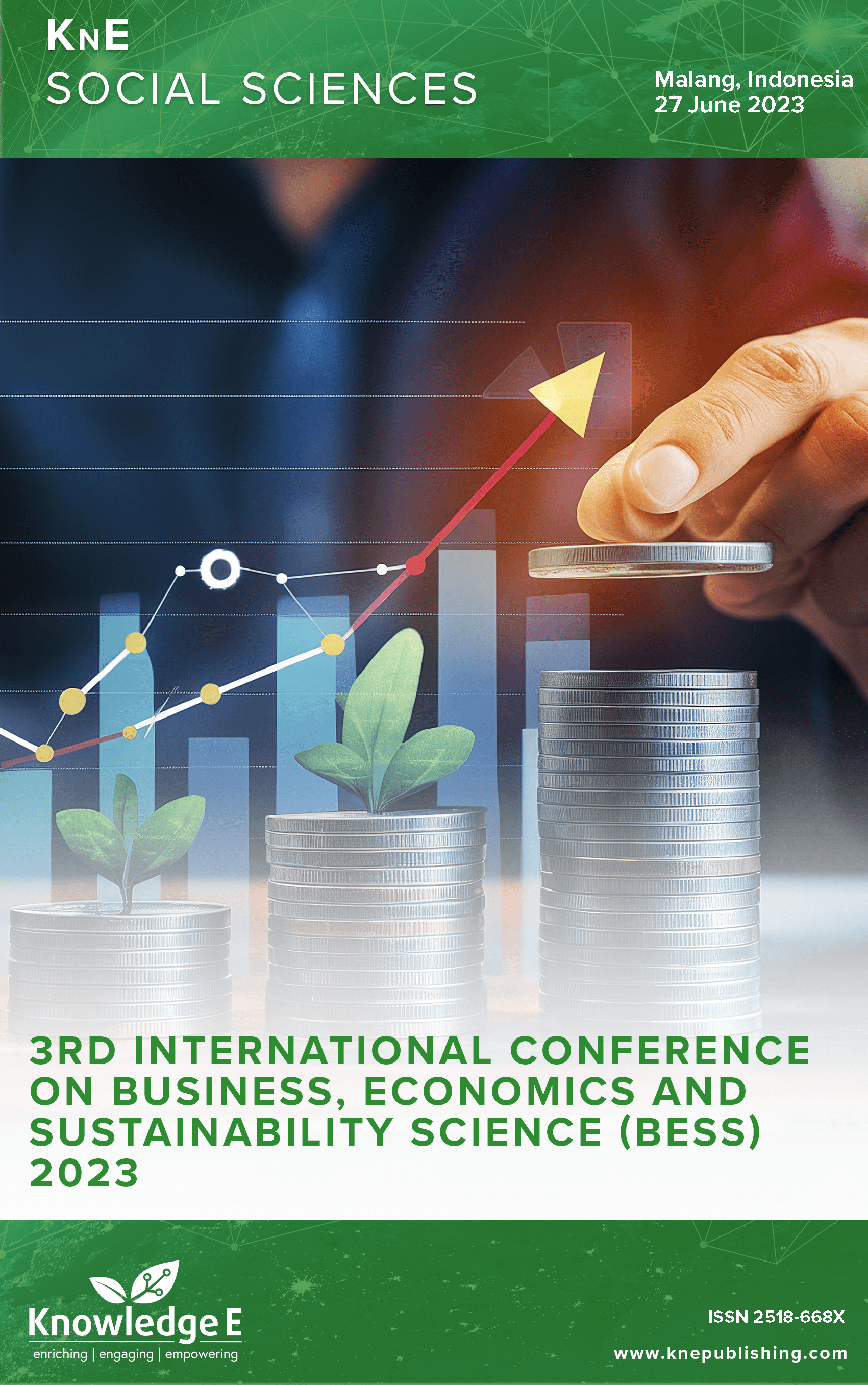Perception of SMEs in East Java on Digitalization Transformation in Business
DOI:
https://doi.org/10.18502/kss.v9i21.16653Abstract
The COVID-19 pandemic has forced SMEs to be able to innovate and transform their businesses into business digitization. It certainly changes the traditional way of selling with an online system. This study aims to analyze the perception of SMEs toward digitalization in business, marketing strategies, and SMEs interest in digital marketing. This research method used is the descriptive quantitative method. Data collection was done using a Google survey. The study results showed that SMEs’ perception toward business digitization was excellent, as its easier for the sellers and buyers to make transactions without meeting. Business digitization can increase revenue turnover, have clearer operating hours, and make it easier to recap sales results. However, SMEs are still in the transition stage to online marketing. Some who have digitized their business prefer ads on free social media. Some still use the traditional method of distributing posters and pamphlets. The interest of SME actors is very high, but it is not followed by effective practice.
Keywords: business, digitalization transformation, perception, small medium enterprise
References
Ahmad SZ, Ahmad N, Abu Bakar AR. Reflections of entrepreneurs of small and medium-sized enterprises concerning the adoption of social media and its impact on performance outcomes: Evidence from the UAE. Telematics and Informatics. 2018;35(1):6–17. https://doi.org/https://doi.org/10.1016/j. tele.2017.09.006 DOI: https://doi.org/10.1016/j.tele.2017.09.006
Ajzen I. The theory of planned behavior. Organ Behav Hum Decis Process. 1991;50(2):179–211. Available from: https://doi.org/https://doi.org/10.1016/0749- 5978(91)90020-T DOI: https://doi.org/10.1016/0749-5978(91)90020-T
Alnaser AS, Habes M, Alghizzawi M, Ali S. The relation among marketing ads, via digital media and mitigate (COVID-19) pandemic in Jordan, the relationship between social media and academic performance: Facebook perspective view project healthcare challenges during COVID-19 pandemic View project. 2020. Dspace.Urbe.University. https://www.researchgate.net/publication/342866347
Bharadwaj A, El Sawy OA, Pavlou PA, Venkatraman N. Digital business strategy toward a next generation of insights. Manage Inf Syst Q. 2013;37(2):471–482. DOI: https://doi.org/10.25300/MISQ/2013/37:2.3
Cestyakara A. Social Media Adoption Model for Smart Entrepreneur. International Conference on ICT for Smart Society. 2013; 1–7. DOI: https://doi.org/10.1109/ICTSS.2013.6588080
Chatterjee S, Kar A. Why do small and medium enterprises use social media marketing and what is the impact: Empirical insights from India. International Journal of Information Management. 2020;53. https://doi.org/. https://doi.org/https://doi.org/10.1016/j.ijinfomgt.2020.102103. DOI: https://doi.org/10.1016/j.ijinfomgt.2020.102103
El Sawy OA, Pereira F. Business modelling in the dynamic digital space: An ecosystem approach. SpringerBriefs in Digital Spaces. Pearson; 2013. DOI: https://doi.org/10.1007/978-3-642-31765-1
Ferdiyantho E. The State of Indonesian SMEs and MSMEs during a pandemic. The State of Indonesian SMEs & MSMEs during a pandemic. 2020. evermos.com
Fichman RG, Dos Santos BL, Zheng ZE. Digital innovation as a fundamental and powerful concept in the information systems curriculum. Manage Inf Syst Q. 2014;38(2):329–415. DOI: https://doi.org/10.25300/MISQ/2014/38.2.01
Gibson JL, Ivancevich JM. Organisasi dan Manajemen. Erlangga; 1994.
Ifinedo P. Internete-business technologies acceptance in Canada’s SMEs. Internet Res. 2011;21(3):255–281. DOI: https://doi.org/10.1108/10662241111139309
Iqbal M, Sucherly S, Azis Y, Kaltum U. Innovation and business strategy at stateowned enterprises: Evidence from Indonesia. 4th International Conference on Management, Economics and Business (ICMEB 2019, 155–159.
Jan PT, Lu HP, Chou TC. The adoption of e-learning: An institutional theory perspective. The Turkish Online Journal of Educational Technology. 2012;11(3):326– 343. http://www.tojet.net/articles/v11i3/11331.pdf
Krech D, Crutchfield RS. Theory and problems of social psychology. McGraw Hill; 1948. https://doi.org/10.1037/10024-000. DOI: https://doi.org/10.1037/10024-000
Lee JW, Becker K, Potluri RM. Antecedents of corporate adoption of social media and the role of the technology acceptance model in the path. Journal of Asian Finance, Economics and Business. 2016;3(2), 67–76. https://doi.org/https://doi. org/https://doi.org/10.13106/jafeb.2016.vol3.no2.67. DOI: https://doi.org/10.13106/jafeb.2016.vol3.no2.67.
Lestarini AH. How SMEs Survive in the midst of a pandemic. Pandemic-Medcom.Id; 2020.
Mayasari IK. “Dear Sis” A case study on trust cultivation on Indonesian Facebook online craft stores. Journal Communication Spectrum. 2019;9(2):79–94. DOI: https://doi.org/10.36782/jcs.v9i2.209
Mehrtens J, Cragg PB, Mills AM. A model of Internet adoption by SMEs. Inf Manage. 2001;39(3):165–76. Available from: https://doi.org/https://doi.org/10.1016/S0378- 7206(01)00086-6 DOI: https://doi.org/10.1016/S0378-7206(01)00086-6
Müller JM, Voigt KI. Sustainable industrial value creation in SMEs: A comparison between Industry 4.0 and Made in China 2025. International Journal of Precision Engineering and Manufacturing - Green Technology. 2018;5(5):659–670. DOI: https://doi.org/10.1007/s40684-018-0056-z
Nicola M, Alsafi Z, Sohrabi C, Kerwan A, Al-Jabir A, Iosifidis C, et al. The socio-economic implications of the coronavirus pandemic (COVID-19): A review. Int J Surg. 2020 Jun;78:185–93. Available from: https://doi.org/https://doi.org/10.1016/j.ijsu.2020.04.018 DOI: https://doi.org/10.1016/j.ijsu.2020.04.018
Odoom R, Anning-Dorson T, Acheampong G. Antecedents of social media usage and performance benefits in small- and medium-sized enterprises (SMEs). J Enterp Inf Manag. 2017;30(3):383–99. DOI: https://doi.org/10.1108/JEIM-04-2016-0088
Pavlou P, Liang H, Xue Y. Understanding and mitigating uncertainty in online exchange relationships: A principal-agent perspective. Manage Inf Syst Q. 2007;31(1):105–136. Available from: https://doi.org/https://doi.org/10.2307/25148783 DOI: https://doi.org/10.2307/25148783
Rahmani N. The condition of MSMEs in Indonesia during the pandemic. Viva.Co.Id; 2021.
Robbins SP, Judge TA. Organizational behavior. 16th ed. United States of America; 2015.
Shapiro C, Varian H. Information rules: A strategic guide to the network economy. Harvard Business School Press; 1999.
Stezner MA. Social Media Marketing Report. 2012.
Teima G, Berthaud A, Bruhn M, De Castro O, Joshi M, Mirmulstein M, Onate A. Scaling-up SME access to financial services in the developing world. International Finance Corporation, World Bank Group. International Finance Corporation. Worldbank.Org. 2010.
Turban E, Aronson J. Decision support systems and intelligent system. New Jersey; 2011.
Wulandari D. Turnover of Traditional Market Traders Drops 40% During the Covid-19 Pandemic. 2020. Ekonomibisnis.Com. Ekonomi Bisnis.com

